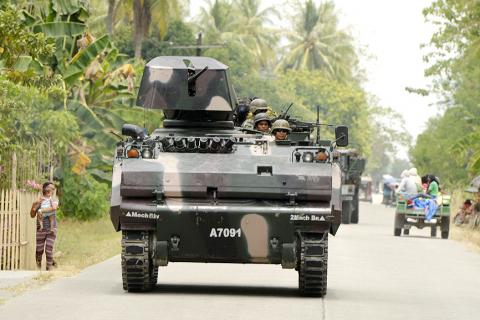Farmer Lot Pangaoilan gazes toward a vast cornfield in the Philippines’ rebel-infested south, hoping that one day he will be able to farm his land without fear of being killed.
For two decades, he has been plowing his 3 hectare plot by hand and with the help of a water buffalo, worried that if he uses a heavy tractor he might detonate an explosive.
“If I am not careful, I might hit a bomb... It could explode and I might die,” Pangaoilan, whose leathery skin, cloudy eyes and thin frame make him look much older than his 50 years, told reporters.

Photo: AFP
Two months ago, the farmer’s marshland village of Tukanalipao was the site of a day-long battle between Muslim militants and police officers that left more than 60 people dead as security forces hunted down alleged top terrorists.
The latest carnage has seriously jeopardized efforts to end a four-decade Muslim separatist rebellion which has claimed an estimated 120,000 lives, dimming hopes again that people such as Pangaoilan will be able to prosper in peace.
The nation’s biggest rebel group, the Moro Islamic Liberation Front (MILF), signed a pact last year agreeing to give up its struggle in return for an autonomous homeland in the impoverished southern region of Mindanao.

Photo: AFP
However, the Jan. 25 battle in Pangaoilan’s village — in which 44 police commandos, 17 rebels and at least three civilians died — triggered a huge political backlash that threatens the passage of a proposed national law endorsing the autonomous region.
The new region would take in large parts of Mindanao, which the nation’s Muslim minority of about 5 million people regard as their ancestral homeland, including Pangaoilan’s village.
Despite fertile farming lands, vast mineral resources and idyllic beaches ripe for tourism, the region is the poorest in the nation, with nearly half of the population living in poverty, according to government data.
Tukanalipao, with no electricity or running water, is a typically impoverished Muslim community in Mindanao.
Its 1,600 residents live in palm thatch houses on wooden stilts, with corn and rice farming their only source of regular income.
Pangaoilan has six children, but he was not able to afford to send them to school. Military leaders say that villages like his make good recruiting grounds for the MILF, which has about 10,000 fighters, and other rebel groups.
In a typical cycle of violence and poverty that builds resentment, a military offensive launched after the January battle against a small breakaway rebel group opposed to the peace process displaced 120,000 people.
Two displacement camps with tarpaulin tents lie on a road close to Tukanalipao, although the military last week declared the offensive over and hopes the displaced people will soon return home.
Corn farmer Haji Maul said he had been in and out of evacuation shelters three times during the offensive to escape bursts of fighting near Tukanalipao, but this was not unusual.
“It has been a very difficult life for me and my family,” Maul, 60, told reporters, as troops wearing helmets and with their rifles pointed to the ground patrolled the parched earth, alongside water buffaloes, chickens and dogs.
As part of its efforts to promote the peace process, Philippine President Benigno Aquino III’s administration has increased annual infrastructure spending on the region from 8 billion Philippine pesos (US$179 million) in 2010 to 24 billion pesos this year.
In Tukanalipao, a sore lack of infrastructure is symbolized by a rickety patchwork of logs that its residents use to cross a stream and get to their farmlands.
When the stream overflows during the rainy season, work stops as farmers can not get their animals across because the improvised bridge might fall apart, Pangaoilan said.
Last week, the government broke ground on a concrete and steel bridge to replace the wooden structure.
Tukanalipao and the surrounding township of Mamasapano has become a “representation” of the Muslim region, Philippine Department of Budget and Management Secretary Florencio Abad told reporters as he guided journalists through the area to witness the ceremony.
“Our presence here today and these symbolic projects are meant to deliver a message that poverty is the root cause of conflict and that we are sincere in pursuing peace,” Abad said as he stood alongside supportive rebel leaders.
The symbolic impact was deepened by building the new bridge in the same area as the deadly battle two months ago, showing that the government and rebels remained partners in peace even in the most volatile of areas, officials said.

BRUSHED OFF: An ambassador to Australia previously said that Beijing does not see a reason to apologize for its naval exercises and military maneuvers in international areas China set off alarm bells in New Zealand when it dispatched powerful warships on unprecedented missions in the South Pacific without explanation, military documents showed. Beijing has spent years expanding its reach in the southern Pacific Ocean, courting island nations with new hospitals, freshly paved roads and generous offers of climate aid. However, these diplomatic efforts have increasingly been accompanied by more overt displays of military power. Three Chinese warships sailed the Tasman Sea between Australia and New Zealand in February, the first time such a task group had been sighted in those waters. “We have never seen vessels with this capability

A Japanese city would urge all smartphone users to limit screen time to two hours a day outside work or school under a proposed ordinance that includes no penalties. The limit — which would be recommended for all residents in Toyoake City — would not be binding and there would be no penalties incurred for higher usage, the draft ordinance showed. The proposal aims “to prevent excessive use of devices causing physical and mental health issues... including sleep problems,” Mayor Masafumi Koki said yesterday. The draft urges elementary-school students to avoid smartphones after 9pm, and junior-high students and older are advised not

Philippine President Ferdinand Marcos Jr has fired his national police chief, who gained attention for leading the separate arrests of former Philippine president Rodrigo Duterte on orders of the International Criminal Court and televangelist Apollo Carreon Quiboloy, who is on the FBI’s most-wanted list for alleged child sex trafficking. Philippine Executive Secretary Lucas Bersamin did not cite a reason for the removal of General Nicolas Torre as head of the 232,000-member national police force, a position he was appointed to by Marcos in May and which he would have held until 2027. He was replaced by another senior police general, Jose

POWER CONFLICT: The US president threatened to deploy National Guards in Baltimore. US media reports said he is also planning to station troops in Chicago US President Donald Trump on Sunday threatened to deploy National Guard troops to yet another Democratic stronghold, the Maryland city of Baltimore, as he seeks to expand his crackdown on crime and immigration. The Republican’s latest online rant about an “out of control, crime-ridden” city comes as Democratic state leaders — including Maryland Governor Wes Moore — line up to berate Trump on a high-profile political stage. Trump this month deployed the National Guard to the streets of Washington, in a widely criticized show of force the president said amounts to a federal takeover of US capital policing. The Guard began carrying